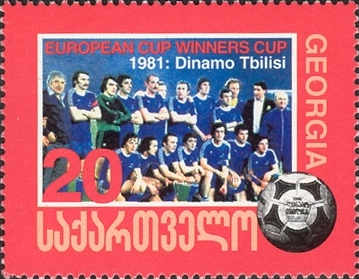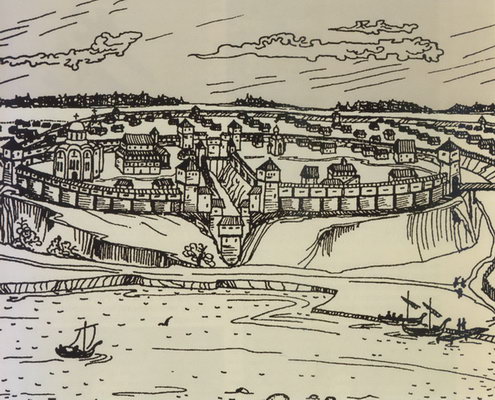|
Gavril Kachalin
Gavriil Dmitriyevich Kachalin (russian: Гавриил Дмитриевич Качалин; 17 January 1911 – 23 May 1995) was a Soviet and Russian football player and coach. He led the USSR national football team to their greatest achievements, Olympics gold medals in 1956 and European Football Championship title in 1960, and also coached them in three World Cups: 1958, 1962 and 1970. With Kachalin, FC Dinamo Tbilisi won the first Soviet Top League title in their history in 1964 and later finished 3rd twice, in 1971 and in 1972. Kachalin became 3rd again in 1973 with FC Dynamo Moscow. Playing career Kachalin started his career in 1928 in the club called Volny Trud. Then he played for Gomel city football team and FC Dynamo Gomel. From 1936 to 1942 he competed for FC Dynamo Moscow. During his career he played in 36 Soviet Top League matches, and became a twice champion in 1937 and 1940 and a Soviet Cup winner in 1937 with Dynamo Moscow. He also played against Basque Countr ... [...More Info...] [...Related Items...] OR: [Wikipedia] [Google] [Baidu] |
FC Dinamo Tbilisi
FC Dinamo Tbilisi ( ka, დინამო თბილისი, ) is a Georgian professional football club based in Tbilisi, Georgia, that competes in the Erovnuli Liga, the top flight of Georgian football. Dinamo Tbilisi was one of the most prominent clubs in Soviet football and a major contender in the Soviet Top League almost immediately after it was established in 1936. The club was then part of one of the leading sport societies in the Soviet Union, the All-Union Dynamo sports society which had several other divisions besides football and was sponsored by the Soviet Ministry of Internal Affairs. Its main claim to European fame was winning the Cup Winners' Cup in 1981, beating FC Carl Zeiss Jena of East Germany 2–1 in the final in Düsseldorf. It remains the only club based in Georgia to have ever lifted a trophy in European competition. Throughout its history, FC Dinamo Tbilisi produced many famous Soviet players: Boris Paichadze, Avtandil Gogoberidze, Shota Iamanidz ... [...More Info...] [...Related Items...] OR: [Wikipedia] [Google] [Baidu] |
1960 European Nations' Cup
The 1960 European Nations' Cup was the first edition of the UEFA European Championship, held every four years and organised by UEFA. The first tournament was held in France. It was won by the Soviet Union, who beat Yugoslavia 2–1 in Paris after extra time. The tournament was a knockout competition; just 17 teams entered with some notable absences, West Germany, Italy and England among those missing. The teams would play home-and-away matches until the semi-finals; the final four teams would then move on to the final tournament, whose host was selected after the teams became known. In the quarter-finals, Spain, who were under Francoist rule, refused to travel to the Soviet Union for political reasons. After a proposal to play the tie over one leg at a neutral venue were rejected by the Soviets, Spain were disqualified: accordingly, three of the final four teams were from communist countries: the USSR, Czechoslovakia, and SFR Yugoslavia, to go with hosts France. In the semi-f ... [...More Info...] [...Related Items...] OR: [Wikipedia] [Google] [Baidu] |
1937 Soviet Cup
The 1937 Soviet Cup was an association football cup competition of the Soviet Union. Competition schedule First round [May 23] Lokomotiv Vologda 1-10 CDKA Moskva SPARTAK Kiev 7-3 Monolit Orekhovo-Zuyevo [May 24] Avangard Leningrad 3-3 Spartak Minsk Avangard Votkinsk 0-8 DINAMO Kazan DINAMO Batumi 2-0 Stroitel Baku DINAMO Gorkiy 5-1 SelMash Lyubertsy Dinamo Ivanovo 0-4 SPATAK-2 Moskva DINAMO Kiev 3-0 DKA Smolensk [Pavel Komarov 1, Nikolai Makhinya 85, Konstantin Shchegodskiy 88] DINAMO Kirov 2-1 Krylya Sovetov Gorkiy [V.Vedernikov, Tatarintsev – A.Tabakov] DINAMO Krasnoyarsk 4-2 Krylya Sovetov Irkutsk [K.Litvinov 5, P.Leonov 30, 33, V.Sokolov 40 - ?] Dinamo Kungur 1-8 DINAMO Leningrad Dinamo Kursk ... [...More Info...] [...Related Items...] OR: [Wikipedia] [Google] [Baidu] |
1940 Soviet Top League ...
Following are the results of the 1940 Soviet Top League football championship. Standings Results Top scorers ;21 goals * Grigory Fedotov (CDKA Moscow) * Sergei Solovyov (Dynamo Moscow) ;15 goals * Nikolay Dementyev (Dynamo Moscow) ;14 goals * Aleksandr Ponomarev (Traktor Stalingrad) ;13 goals * Gaioz Jejelava (Dinamo Tbilisi) * Pavel Kornilov (Spartak Moscow) * Viktor Semyonov (Spartak Moscow) * Mikhail Semichastny (Dynamo Moscow) ;12 goals * Boris Paichadze (Dinamo Tbilisi) ;11 goals * Viktor Berezhnoy (Dinamo Tbilisi) References Soviet Union - List of final tables (RSSSF) {{1940–41 in European football (UEFA) Soviet Top League seasons 1 Soviet Soviet The Soviet Union,. officially the Union of Soviet Socialist Republics. (USSR),. was a transcontinental country that spanned much of Eurasia from 1922 to 1991. A flagship communist state, it was nominally a federal union of fifteen nation ... [...More Info...] [...Related Items...] OR: [Wikipedia] [Google] [Baidu] |
1937 Soviet Top League
The 1937 Soviet Top League was the third season of the Soviet Top League. Format This year it was decided to have both season halves combined. After playing two games in the Group B it was decided to return CDKA Moscow back to the Group A. The Group ''A'' was extended once again to nine teams with a new team FC Metallurg Moscow joining the group that won the 1936 Group B fall championship. At the end of the season no teams were relegated as the group was planned to be extended for the next season. The season started in the summer after the cup competition that preceded it and was also won by Dynamo Moscow. The defending champion for this edition was FC Spartak Moscow. The season started somewhat late on July 23, 1937, with the game in Kyiv where the League newcomer Metallurg surprisingly defeated the local Dynamo 2:0. The conclusion of the season came on October 30, 1937, with the games in Tbilisi and Moscow's Sokolniki. That game on CSKA Stadium became a culminating as the Arm ... [...More Info...] [...Related Items...] OR: [Wikipedia] [Google] [Baidu] |
FIFA
FIFA (; stands for ''Fédération Internationale de Football Association'' ( French), meaning International Association Football Federation ) is the international governing body of association football, beach football and futsal. It was founded in 1904 to oversee international competition among the national associations of Belgium, Denmark, France, Germany, the Netherlands, Spain, Sweden and Switzerland. Headquartered in Zürich, Switzerland, its membership now comprises 211 national associations. These national associations must each also be members of one of the six regional confederations into which the world is divided: CAF (Africa), AFC (Asia and Australia), UEFA (Europe), CONCACAF (North & Central America and the Caribbean), OFC (Oceania) and CONMEBOL (South America). FIFA outlines a number of objectives in the organizational Statutes, including growing association football internationally, providing efforts to ensure it is accessible to everyone, and advocating for ... [...More Info...] [...Related Items...] OR: [Wikipedia] [Google] [Baidu] |
Basque Country National Football Team
The Basque Country representative football team (officially, in Basque, 'Euskal selekzioa') represents the Basque Country in football. It selects players from the Basque Country autonomous community, Navarre and the French Basque Country and is organised by the Basque Football Federation. It is not affiliated with FIFA or UEFA and therefore only allowed to play friendly matches against FIFA or non-FIFA affiliated teams. The team has been referred to by various names including ''Euskadiko selekzioa, Euskal Herriko futbol selekzioa, Selección de Euskadi, Vasconia, Equipo Vasco, Euskadi XI'' and ''Basque XI''. Most of their home matches have been played in the San Mamés Stadium which was replaced in 2013 by the new San Mamés. The Basque Country has had a football team of its own since 1930. During the Second Spanish Republic, they played firstly under the name of '' Baskoniako selekzioa'' (the Vasconia team) and then from 1936 as ''Euzkadiko selekzioa'' (the Euskadi team). D ... [...More Info...] [...Related Items...] OR: [Wikipedia] [Google] [Baidu] |
Soviet Cup
The Soviet Cup, or USSR Cup (russian: Кубок СССР),, be, Кубак СССР, uz, СССР Кубоги, kk, КСРО Кубогы, ka, სსრკ თასი, az, ССРИ кубоку, lt, TSRS taurė, ro, Cupa URSS (Moldovan Cyrillic: Купа УРСС), lv, PSRS kauss, hy, ԽՍՀՄ Գավաթ, et, NSVL Karikas. was the premier football cup competition in the Soviet Union conducted by the Football Federation of the Soviet Union. As a knockout tournament it was conducted parallel to the All-Union league competitions in double round-robin format. The winner of the competition was awarded a qualification to the UEFA Cup Winners' Cup, unless it already qualified for the European Cup, in turn passed the qualification to the finalist. In case if a team would win the UEFA Cup Winners' Cup and not win its national league cup titles next year, it qualified to the UEFA Cup Winners' Cup along with the new cup holder. The first participation in the UEFA Cup Winners' ... [...More Info...] [...Related Items...] OR: [Wikipedia] [Google] [Baidu] |
Gomel
Gomel (russian: Гомель, ) or Homiel ( be, Гомель, ) is the administrative centre of Gomel Region and the second-largest city in Belarus with 526,872 inhabitants (2015 census). Etymology There are at least six narratives of the origin of the city's name. The most plausible is that the name is derived from the name of the stream Homeyuk, which flowed into the river Sozh near the foot of the hill where the first settlement was founded. Names of other Belarusian cities are formed along these lines: for example, the name Minsk is derived from the river Menka, Polatsk from the river Palata, and Vitsebsk from the river Vitsba. The first appearance of the name, as "Gomy", dates from 1142. Up to the 16th century, the city was mentioned as Hom', Homye, Homiy, Homey, or Homyi. These forms are tentatively explained as derivatives of an unattested ''*gomŭ'' of uncertain meaning. The modern name for the city has been in use only since the 16th or 17th centuries. History Unde ... [...More Info...] [...Related Items...] OR: [Wikipedia] [Google] [Baidu] |
Soviet Top League
The Soviet Top League, known after 1970 as the Higher League (russian: Чемпионат СССР по футболу: Высшая лига), served as the top division of Soviet Union football from 1936 until 1991. The professional top level of football competition among clubs was established in 1936 on proposition of Nikolai Starostin and was approved by the All-Union Council of Physical Culture. Originally it was named Group A. After World War II it became known as the First Group. In 1950, after another reform of football in the Soviet Union, the First Group was replaced with Class A. By 1970, the Class A had expanded to three tiers with the top tier known as the Higher Group which in 1971 was renamed into the Higher League. It was one of the best football leagues in Europe, ranking second among the UEFA members in 1988–89 seasons. Three of its representatives reached the finals of the European club tournaments on four occasions: FC Dynamo Kyiv, FC Dinamo Tbilisi, and F ... [...More Info...] [...Related Items...] OR: [Wikipedia] [Google] [Baidu] |
1970 FIFA World Cup
The 1970 FIFA World Cup was the ninth edition of the FIFA World Cup, the quadrennial international Association football, football championship for List of men's national association football teams, men's senior national teams. Held from 31 May to 21 June in Mexico, it was the first World Cup tournament held outside Europe and South America, and it was also the first held in North America. Teams representing 75 nations from all six populated continents entered the competition, and its 1970 FIFA World Cup qualification, qualification rounds began in May 1968. Fourteen teams qualified from this process to join host nation Mexico national football team, Mexico and defending champions England national football team, England in the 16-team final tournament. El Salvador national football team, El Salvador, Israel national football team, Israel and Morocco national football team, Morocco made their debut appearances at the final stage. The 1970 FIFA World Cup Final, tournament final had ... [...More Info...] [...Related Items...] OR: [Wikipedia] [Google] [Baidu] |






